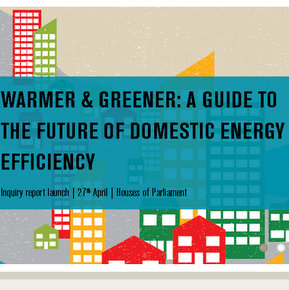
Warmer & Greener – the future of domestic energy efficiency
 New report launched today on the future of domestic energy efficiency policy in the UK calls for local authorities, national government and businesses in the housebuilding sector to act on 17 key recommendations.
New report launched today on the future of domestic energy efficiency policy in the UK calls for local authorities, national government and businesses in the housebuilding sector to act on 17 key recommendations.
Warmer & Greener: a guide to the future of domestic energy efficiency policy is a detailed insight into the future of domestic energy efficiency, calling on local authorities, national government and businesses in the housebuilding sector to act upon its recommendations.
 The report, launched at the Westminster Sustainable Business Forum (WSBF) in Parliament, comes after a 9 month inquiry which included several evidence giving sessions and evidence gathering exercises.
The report, launched at the Westminster Sustainable Business Forum (WSBF) in Parliament, comes after a 9 month inquiry which included several evidence giving sessions and evidence gathering exercises.
Read ‘WARMER & GREENER’ Report
Making energy efficiency a reality in the building industry
Peter Aldous MP and Dr Alan Whitehead MP: “This report provides an extremely useful guide to the future of domestic energy efficiency policy. It could not come at a better time.”
The report provides a strategic signpost for the future of domestic energy efficiency policy. It assesses how the government can drive improvements in the efficiency of people’s homes from the basic design of policy to practical initiatives across the housing construction industry, local authorities and housing associations.
Warmer & Greener not only provides a succinct and useful overview of the key issues for domestic energy efficiency, but workable solutions that can be applied across the different housing sectors. This report follows a 9 month inquiry which consulted central government departments, energy suppliers, local authorities and installers to name but a few. The inquiry was co-chaired by Peter Aldous MP and Dr Alan Whitehead MP and overseen by a politically neutral steering group of members including senior representatives from ADEY, the British Board of Agrément and Willmott Dixon.
In a climate where housing is a key aspect of political debate, from building new homes to refurbishing existing ones, Warmer & Greener recommends a re-instatement of the zero carbon standard for newly built homes in an improved format, and proposes the implementation of a myriad of educational and monetary incentives to encourage home owners to invest in energy efficiency measures.
What does this mean for the building industry?
One of the major themes of the report is the need to create an energy efficiency industry which is more vibrant and self-sufficient. Warmer & Greener also asks for government policy to provide more certainty and support for the development of the industry so that it can flourish. With a number of changes in policy relating to energy efficiency in recent years – including the revision of energy savings targets for ECO and the move away from the original focus on more expensive measures; plus the ending of the Landlord’s Energy Savings Allowance, the Code for Sustainable Homes and zero carbon homes standards; and the discontinuation of funding for the Green Deal – a lack of certainty and consistency has undermined the confidence of the energy efficiency industry to invest in training, research, product development and marketing. Ultimately, firms in the building industry have become suspicious of potential future government schemes.
Construction & energy efficiency industry working together
Policy certainty can help with this. The authors of the report call for the building and the energy efficiency industry to become more joined up. There is an opportunity to remove the existing ‘artificial barrier’ between the two sectors, specifically pointing to the potential of aligning the installation of energy efficiency measures with other renovations, potentially reducing hassle and cost for the householder and thus making energy efficiency more attractive. If there was much greater demand for energy efficiency measures, more building firms would start to provide energy efficiency measures.
Dutch Energiesprong scheme
Furthermore, the WSBF makes a groundbreaking recommendation to government for support of the Dutch Energiesprong scheme. This scheme has never been formally recommended to the government in this way. Developed in the Netherlands in 2010, Energiesprong aims to create a step change in the energy efficiency market and offer whole house retrofits to net-zero energy levels in a totally new way. The initial focus of the project has been on social housing, with social housing providers making an upfront investment and then recouping the money through energy plans which tenants pay on a monthly basis instead of their energy bills. Energy plans are similar to mobile phone contracts with an allowance for usage in that you get a standard contract, and any excess energy used you need to pay for on top.
This scheme does, however, come with a number of challenges including complexity of these large scale deals, planning constraints and the financial restrictions currently in existence in the social housing sector. All in all, the scheme brings energy efficient homes far more into reach. It needs governmental backing to truly get off the ground but in the long run it could deliver retrofits on a mass scale without the need for any government support.
Implementing the strategies
Finally, the report urges government and industry to consider how builders, particularly local traders and suppliers, as well as local authorities, can play a greater role in providing energy efficiency advice and guidance. In order to implement the above strategies, it is necessary to advance a ‘grassroots’ approach to compliment the ‘top down’ approach through policy development. Widespread education around energy efficiency will help to increase people’s awareness of the issues and mean more people come to expect their homes to be energy efficient.
Aside from saving on energy bills, Warmer & Greener especially works to highlight that the implementation of energy efficiency measures will mean that people will live more comfortable, healthy lives, meaning they can contribute to the economy more effectively, live longer and depend less on the NHS.
17 key recommendations
The reports Executive Summary includes these 17 specific recommendations:
1] The Government should reinstate a long term, mandatory zero carbon standard for newly built homes.
2] The minimum energy efficiency standards need to be strengthened to ensure that they have a meaningful impact. The problems associated with the Green Deal, Houses in Multiple Occupation and landlords’ awareness of the regulations need to be addressed.
3] In the long term, the minimum energy efficiency standards for private rented sector properties need to be increased beyond an EPC E rating.
4] The Government should mandate that advertising of private rented accommodation includes a figure for monthly expected energy costs calculated from the EPC for that property.
5] The Government should introduce minimum energy efficiency standards for the sale of properties, which are increased progressively over time.
6] A new decent homes standard should be launched in the social housing sector with a greater focus on energy efficiency.
7] The next phase of ECO should be based on a system of deemed scores and the Government should aim to reduce the overall administrative burden imposed on those involved in its delivery.
8] The next phase of ECO should be supported by a tax-payer funded fuel poverty scheme administered by local actors.
9] Mortgage lenders should include more accurate calculations of energy costs in their mortgage affordability assessments. This can be achieved either on a voluntary basis or through changes to the Mortgage Market Review. In tandem with changes to mortgage affordability assessments, lenders should provide mortgage extensions to finance energy efficiency measures.
10] The Government should introduce a stamp duty incentive to encourage the uptake of energy efficiency measures in the domestic sector. A rebate on the surcharge on buy-to-let properties and second homes could be included within this, either as an interim measure or as part of a wider strategy.
11] Government and commercial campaigns promoting energy efficiency measures should emphasise their numerous benefits and not focus narrowly on bill savings.
12] Local authorities should work with relevant third and private sector groups to showcase retrofitted homes in their area.
13] Support for the end user to understand energy efficiency measures installed in their home should be robustly enforced as part of the quality assurance of installers’ work.
14] The details of the next phase of ECO need to be set out as soon as possible to provide clarity to suppliers and their supply chain. The scheme should also remain consistent once it is implemented to avoid creating uncertainty.
15] The Government needs to manage the transition to the next phase of ECO to avoid the breaks in demand which have been a feature of changeovers between past supplier obligation schemes.
16] Future domestic energy efficiency policy should aim to provide a much greater degree of certainty to industry than has been achieved in recent years.
17] The Government should engage with Energiesprong UK to reduce barriers to its development and provide some initial, small-scale funding to the project.
To find out more and to download the report for free visit www.policyconnect.org.uk/wsbf.
Latest news

21st February 2025
ASSA ABLOY EMEIA: Save valuable time and money with a seamless switch to programmable digital keys
In 2025, access management can be a whole lot easier. By making access part of their digital processes, businesses can put time-consuming key management and the cost of changing the locks firmly behind them. Making this switch is a lot easier than many people think, as ASSA ABLOY explains here…
Posted in Access Control & Door Entry Systems, Architectural Ironmongery, Articles, Building Industry News, Building Products & Structures, Building Services, Doors, Facility Management & Building Services, Health & Safety, Information Technology, Innovations & New Products, Retrofit & Renovation, Security and Fire Protection
21st February 2025
Showersave supports industry leaders in addressing Part L and Part G regulations
Showersave has sponsored and participated in a recent Building Insights LIVE roundtable on ‘Water & Energy Saving Innovations in New Build Housing’.
Posted in Articles, Bathrooms & Toilets, Bathrooms, Bedrooms & Washrooms, Building Associations & Institutes, Building Industry Events, Building Industry News, Building Products & Structures, Building Regulations & Accreditations, Building Services, Exhibitions and Conferences, Interiors, Pipes & Fittings, Plumbing, Retrofit & Renovation, Sustainability & Energy Efficiency
21st February 2025
GEZE: The importance of Specifying High Quality Door Closers on Fire Doors
Andy Howland, Sales & Marketing Director at GEZE UK, discusses why specifying high quality door closers on fire doors is important…
Posted in Access Control & Door Entry Systems, Accessibility, Architectural Ironmongery, Articles, Building Industry News, Building Products & Structures, Building Regulations & Accreditations, Building Services, Doors, Facility Management & Building Services, Health & Safety, Posts, Restoration & Refurbishment, Retrofit & Renovation, Security and Fire Protection
21st February 2025
Insight Data achieves ISO9001 recertification with zero non-conformities
Leading industry data specialist, Insight Data, has successfully achieved the prestigious recertification for ISO9001 with zero non-conformities for the fourth consecutive year.
Posted in Articles, Building Industry News, Building Regulations & Accreditations, Building Services, Information Technology, Research & Materials Testing
 Sign up:
Sign up: